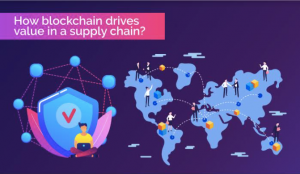Facilitate risk mitigation to come up with risk-free supply chains via the implementation of the best supply chain blockchain management solutions from Tracefood!
When it comes to efficient supply chain management, making all the participants getting connected is actually the challenging part as it involves a huge number of stakeholders. For instance, let us take a confined supply chain system with a vast range of network participants.
Here, you might possibly think that everybody in the network will have some sort of connection with all others, thus having transparency in the overall network operations. But, that is not the case actually once before blockchain’s entry into the market.
Right after the introduction of blockchain, the business supply chain systems have started acquiring 100% transparency in their overall system operations. Here is where the blockchain in the supply chain finds its importance in bringing direct connectivity among all the network participants, thus aiming to introduce a greater level of trust in the system.
Thus blockchain in supply chain comes as an effective source of introducing links in a supply chain ecosystem thereby making the users get access to a shared pool of system data. Besides, supply chain blockchain help optimize the flow of products right for obtaining 100% efficiency as well in the system.
Blockchain’s unique properties have made it possible for everyone in a value chain to track the origin and flow of products exactly so as to avoid the disputes that are about to rise. Transparency is what plays a crucial role in addressing the business supply chain challenges and this can be achieved only with supply chain blockchain solutions.
Blockchain in supply chain stands out to be the best technology ever in benefiting both the supply chain businesses and the consumers by incorporating efficient practices.
What actually is the concern with today’s modern supply chains?
The proper cum effectual management of supply chains seems out to be complex today since it involves handling a variety of aspects right from the production (creation) to the supply (distribution). Based on the product’s nature and type, the respective supply chain comprises some thousands of intermediate phases, business entities/organizations, individual contributors, payments, and invoices. Here is where the complexities in relation to transparency come in as the means of reducing the integrity of the entire system.
Broken nature of supply chains at present:
Some hundreds of years ago, the supply chains were very simple due to the local business commerce. But if we take any product supply chain as of now, the system stands broken in a variety of ways due to the incredible complexities with the business operations today.
With respect to the globalization of trades today, product management gets even harder than before thus making us go for a potent technology like blockchain to deal with such immense complexities. Supply Chain Blockchain Management is meant primarily for recollecting all the broken pieces of a product supply to get done with the final desired product.
Moreover, with respect to the broken supply chains, the product purchasers (buyers) and the end-users (customers) find it hard to know the exact value of products moving across a complex value chain network.
The lack of transparency further boosts up the gap that already exists between participants working for a product supply, thus seeming to enhance the difficulties in relation to the product supply. With this trend, there also comes an additional challenge that we can’t investigate the supply chains for any unauthorized or illegal practice that may happen in the system.
Fine, blockchain in supply chain management comes as an all – in – one solution to keep track of the supply chain system improvement for better results.
What actually a blockchain is and how could it help transform the supply chains?
Blockchain is a distributed ledger technology that comes up to facilitate business contracts or agreements, exchanges, and payments. Blockchain makes each and every business transaction to get recorded over the public blocks and multiple ledger copies to help prioritize transparency in the system.
Security is what can also be brought by blockchain to the supply chain systems. In addition, blockchain never ever allows any central authority to come into the system to have control over it, thus ensuring a greater level of transparency and efficiency in the system.
Blockchain as well helps us improve the provenance and product safety thus safeguarding the product from liability issues. This would certainly improve the sustainability levels.
Thus as a whole, blockchain in supply chains seems to have a huge positive impact right from the product production and warehousing to the delivery and payment side.
How blockchain drives value in a supply chain?

Blockchain brings value for the supply chains right with the following steps:
- Ideate: Sketching up a plan to help improve the opportunities that are coming up on the path of customers and the suppliers thereby reducing the risks associated.
- Create: Gaining access to central data information sources to facilitate a viable system design.
- Sourcing out: Tracking the better ways of reducing paperwork and cost involved via smart contract integration.
- Make: Boosting up the standards of compliance and visibility associated with product manufacturing.
- Delivery: Ensuring product delivery to the appropriate end-users or consumers by figuring out each and step involved in the product supply journey.
- Return: Recalling products based on the available system data.
How is blockchain more likely to change the future of supply chains?
Even though many new upcoming technologies are found to have promising opportunities for bringing upgrades in the supply chain system functionalities, Blockchain reaps out the most. It gives us a blend of various supply chain blockchain management aspects like transparency, immutability, traceability, and so on via one single platform and no other platforms have the potential alike.
Blockchain on the other side proves out to be very much cost-effective on par with its competing technologies in the industry.